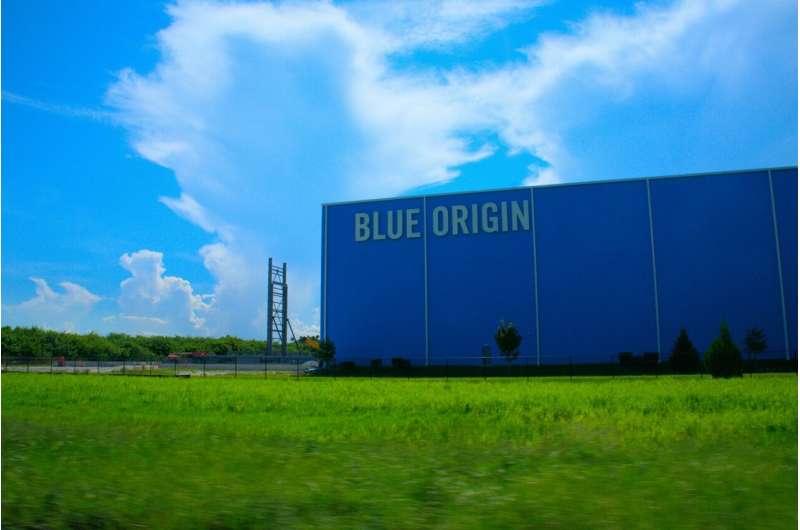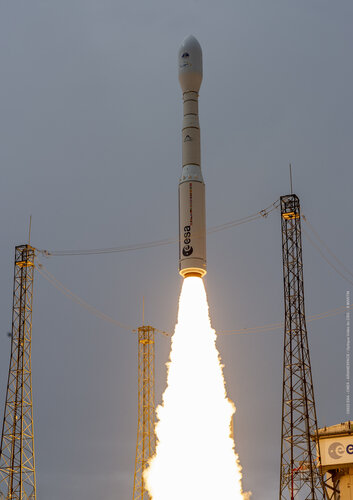Blue Origin logs SpaceX Starship concerns as it preps for 1st New Glenn launch
Friday, 05 July 2024 10:10
As Jeff Bezos' Blue Origin prepares for the first launch of its New Glenn rocket from Cape Canaveral this year, the company has taken time to voice concerns over future launches of competitor SpaceX's massive Starship and Super Heavy, also planning to launch from the Space Coast.
Elon Musk's company continues development of the most powerful rocket ever to reach orbit from its test site in Texas, but has plans for launch pads at both Cape Canaveral Space Force Station and neighboring Kennedy Space Center.
The Department of the Air Force is the midst of an Environmental Impact Statement (EIS) for the new rocket to launch from Canaveral's Space Launch Complex 37 aiming to take over the space that was used by United Launch Alliance until its final launch of the Delta IV Heavy earlier this year.
Meanwhile, the Federal Aviation Administration is performing a similar environmental impact assessment on a Starship launch pad from KSC's Launch Complex 39-A where SpaceX currently flies its Falcon 9 and Falcon Heavy rockets.
The period for public comment on the FAA's assessment continued through June 24 before the EIS moved into its next phases.
ESA Council decisions set the stage for more diverse European launch services
Friday, 05 July 2024 09:57
Ariane 6: Europe’s next big rocket in a nutshell
Friday, 05 July 2024 09:00 Video:
00:05:13
Video:
00:05:13
Ariane 6 is the newest rocket in a series that has, for five decades, been launching Europe towards the stars. Building on all the knowledge, expertise and technology developed over the years, Ariane 6 will be versatile, modular, and European.
Guaranteeing Europe’s access to space for the next years, Ariane 6 in two versions, with either two or four boosters attached depending on the ‘oomph’ the mission requires. Versatile, its upper stage can reignite multiple times during a single flight, placing any spacecraft into any orbit – including constellations – saving a final boost to return and burn
Earth from Space: Madeira
Friday, 05 July 2024 08:00 Image:
The Copernicus Sentinel-2 mission captured a rare, cloud-free image over the Portuguese archipelago of Madeira in the North Atlantic Ocean.
Image:
The Copernicus Sentinel-2 mission captured a rare, cloud-free image over the Portuguese archipelago of Madeira in the North Atlantic Ocean. Webb admires bejewelled ring
Friday, 05 July 2024 07:00 Image:
Webb admires bejewelled ring
Image:
Webb admires bejewelled ring Europe’s Earth Return Orbiter reaches design maturity
Friday, 05 July 2024 05:39
ESA’s Earth Return Orbiter, the first spacecraft that will rendezvous and capture an object around another planet, passed a key milestone to bring the first Mars samples back to Earth.
Firefly Aerospace Successfully Launches Eight CubeSat Satellites
Thursday, 04 July 2024 16:56 Firefly Aerospace successfully launched its Alpha rocket carrying eight CubeSat satellites into space on Tuesday night from California's Vandenberg Space Force Base. This mission marks a significant achievement following a previous scrub due to ground systems issues.
The CubeSats were launched under NASA's Launch Services Program Venture, providing satellite developers at U.S. universities
Firefly Aerospace successfully launched its Alpha rocket carrying eight CubeSat satellites into space on Tuesday night from California's Vandenberg Space Force Base. This mission marks a significant achievement following a previous scrub due to ground systems issues.
The CubeSats were launched under NASA's Launch Services Program Venture, providing satellite developers at U.S. universities This desert moss has the potential to grow on Mars
Thursday, 04 July 2024 16:56 The desert moss Syntrichia caninervis is a promising candidate for Mars colonization thanks to its extreme ability to tolerate harsh conditions lethal to most life forms. The moss is well known for its ability to tolerate drought conditions, but researchers report June 30 in the journal The Innovation that it can also survive freezing temperatures as low as -196C, high levels of gamma radiation,
The desert moss Syntrichia caninervis is a promising candidate for Mars colonization thanks to its extreme ability to tolerate harsh conditions lethal to most life forms. The moss is well known for its ability to tolerate drought conditions, but researchers report June 30 in the journal The Innovation that it can also survive freezing temperatures as low as -196C, high levels of gamma radiation, Geoscientists dig into why we may be alone in the Milky Way
Thursday, 04 July 2024 16:56 New research by University of Texas at Dallas geoscientist Dr. Robert Stern and a colleague suggests a geological explanation for why conclusive evidence for advanced extraterrestrial (ET) civilizations has not been found, even though the Drake equation predicts that there should be many such civilizations in our galaxy capable of communicating with us.
In a study published online April 12
New research by University of Texas at Dallas geoscientist Dr. Robert Stern and a colleague suggests a geological explanation for why conclusive evidence for advanced extraterrestrial (ET) civilizations has not been found, even though the Drake equation predicts that there should be many such civilizations in our galaxy capable of communicating with us.
In a study published online April 12 Dhruva Space partners with Kinis to provide space-based IoT connectivity in India
Thursday, 04 July 2024 16:56 In a groundbreaking initiative to fortify global satellite connectivity, full-stack Space Engineering solutions provider Dhruva Space and France-based satellite operator global IoT connectivity provider Kinis have strengthened their collaboration to introduce Kinis IoT connectivity in India, and to launch a Kinis IoT payload on Dhruva Space P-30 satellite.
This partnership is focused on Dh
In a groundbreaking initiative to fortify global satellite connectivity, full-stack Space Engineering solutions provider Dhruva Space and France-based satellite operator global IoT connectivity provider Kinis have strengthened their collaboration to introduce Kinis IoT connectivity in India, and to launch a Kinis IoT payload on Dhruva Space P-30 satellite.
This partnership is focused on Dh Icesat-2 Resumes Data Collection After Solar Storms
Thursday, 04 July 2024 16:56 the space agencys ICESat-2 satellite returned to science mode on June 21 UTC, after solar storms in May caused its height-measuring instrument to go into a safe hold. The ICESat-2 team restarted the missions instrument, a lidar called the Advanced Topographic Laser Altimeter System (ATLAS), which is once again collecting precise data on the height of Earths ice, water, forests and land cover. No
the space agencys ICESat-2 satellite returned to science mode on June 21 UTC, after solar storms in May caused its height-measuring instrument to go into a safe hold. The ICESat-2 team restarted the missions instrument, a lidar called the Advanced Topographic Laser Altimeter System (ATLAS), which is once again collecting precise data on the height of Earths ice, water, forests and land cover. No Indonesia aims to build cutting-edge spaceport but faces obstacles
Thursday, 04 July 2024 16:56 Indonesia aims to launch 19 satellites into low-Earth orbit next year, part of an ambitious plan to move the country into the forefront of the world's growing space industry and reduce its reliance on other countries for its satellite data.
The broader program, known as the 2045 space map, is set to begin next year. Officials hope to boost Indonesia's economy and drive foreign direct inves
Indonesia aims to launch 19 satellites into low-Earth orbit next year, part of an ambitious plan to move the country into the forefront of the world's growing space industry and reduce its reliance on other countries for its satellite data.
The broader program, known as the 2045 space map, is set to begin next year. Officials hope to boost Indonesia's economy and drive foreign direct inves Ariane 6 first flight timeline
Thursday, 04 July 2024 14:21 Image:
Ariane 6 first flight timeline
Image:
Ariane 6 first flight timeline 


